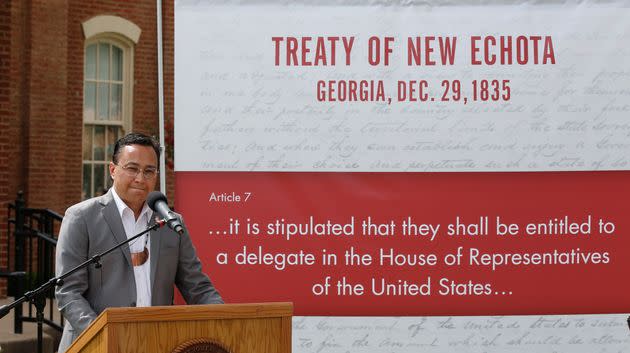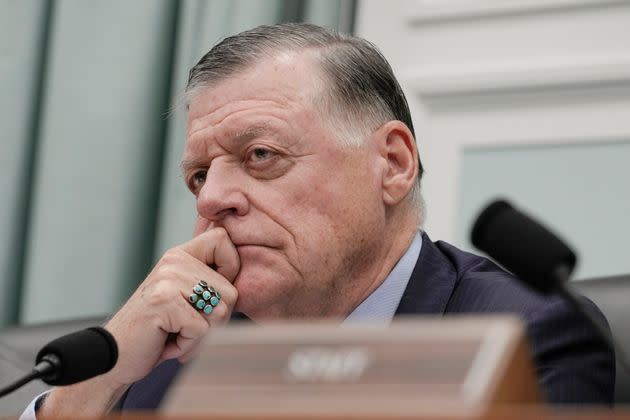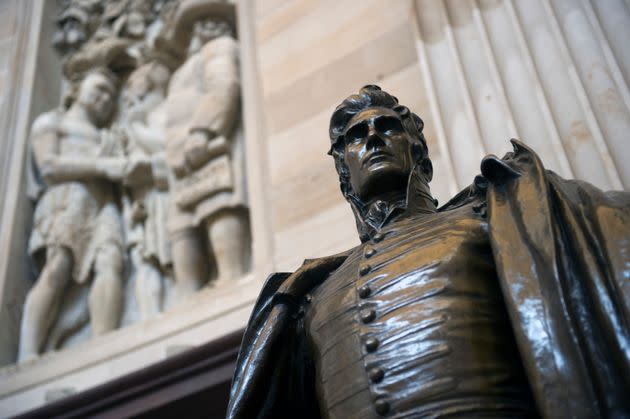Legacy Of The Trail Of Tears Complicating Bid For Cherokee Representation In House

Cherokee Nation Principal Chief Chuck Hoskin Jr. at the announcement in August 2019 that the tribe planned to ask Congress to seat a non-voting Cherokee delegate, as called for in a 19th century treaty.
Tori Holland’s family is split. Her husband and her children are enrolled citizens of the Cherokee Nation in Oklahoma. She belongs to a different, much smaller federally recognized tribe of Cherokees, the United Keetoowah Band.
In fact, she is who the United Keetoowah Band wants to send to Washington as a delegate to represent the Cherokee under a 19th-century treaty signed by the government. But if that happens, it could endanger the chances for her children and husband to get their own representation. And the split, with its roots in the forced displacement of the Cherokee by white settlers, appears likely to sink the hopes of tribal representation all together.
There is clear sympathy on Capitol Hill for giving the Cherokees a nonvoting delegate in the House similar to delegates from U.S. territories and other jurisdictions, but lawmakers have little interest in negotiating the disagreements of the different Cherokee tribes.
There are not one, not two, but three different bands of Cherokees with legally justifiable claims to having a delegate. And two of them say all three should be granted delegates or none should get one.

House Rules Committee Chair Tom Cole (R-Okla.) said lawmakers are wary of getting caught up in a dispute over which tribe would be able to send a Cherokee delegate to the House under an 1835 treaty.
The dispute brings into sharp contrast the differences between tribes by pitting one of the best-known ones ― the Cherokee Nation, which says it has the sole right to a delegate ― against two smaller ones, one with substantial financial resources and the other without.
“Here we have one Cherokee people, which have now been broken into three separate Cherokee tribes, all with equal rights,” Holland told HuffPost in a recent interview.
Understanding the dispute requires understanding the Cherokees’ history, both before and after their removal from the Southeastern U.S. and the deaths of about a quarter of the Cherokee population along the infamous Trail of Tears ending in Oklahoma.
The Cherokee range once extended as far north as West Virginia and as far south as Alabama, and from the western tip of North Carolina east to South Carolina. But as colonial settlers pressed westward, the tribe felt increasingly hemmed in and conflicts increased.
In 1817, one band of Cherokees moved west of the Mississippi River to escape. The main band of Cherokees remained in the diminishing land available. In 1827, after the Cherokees adopted a constitution modeled on that of the U.S., Georgia declared the Cherokees there to be subject to state laws, which prompted the tribe to sue.
Congress made a promise. Is Congress going to keep that promise? And if so, they need to do so equally.Tori Holland, proposed delegate to Congress for the United Keetoowah Band of Cherokee Indians
The Cherokees won in the U.S. Supreme Court in 1832, but President Andrew Jackson, who made his political name by brutally fighting tribes in the Southeast, went ahead with removal anyway in 1835 with the signing of the Treaty of New Echota. The disputed treaty ― modern Cherokees argue the signers did not have the authority to reach such an agreement ― triggered the Trail of Tears in 1838.
But many Cherokees stayed behind, hiding in the hills of Western North Carolina to avoid being forcibly marched to what is now Oklahoma.
And the descendants of each of those groups now comprise three federally recognized Native American tribes. The early resettlers became the United Keetoowah Band of Cherokee Indians, based in Tahlequah, Oklahoma. The bulk of the tribe became the Cherokee Nation, also based in Tahlequah. And the ones who stayed behind became the Eastern Band of the Cherokee Indians, based in Cherokee, North Carolina.
Holland said her tribe, the United Keetoowah Band, was known as being more culturally conservative than what would become known as the Cherokee Nation.
“The Western Cherokee were primarily more of the full-blooded Cherokee who wanted to hold on to tradition, culture and values that we had and not assimilate so much to the ‘white man’s world,’” she said.
The legacy of the Jacksonian removal policy muddies the waters for the delegate issue. Part of the Treaty of New Echota says the Cherokees “shall be entitled to a delegate in the House of Representatives of the United States whenever Congress shall make provision for the same.”
At a hearing in November, Cherokee Nation Principal Chief Chuck Hoskin Jr. made the case to members of the House Rules Committee that his tribe was the obvious successor to the treaty. In 2019, Hoskin began the scramble for a delegate by announcing he wanted the U.S. to stand by the treaty and allow him to appoint one.

The welcome sign near the entrance of the Cherokee Visitor Information center in Cherokee, N.C., in a file photo from 2015. The Eastern Band of Cherokee Indians is one of three bands created by the removal of much of the tribe to Oklahoma during the Trail of Tears.
“It is my firm belief and expectation that the House of Representatives will take swift action to seat our delegate to Congress, honor our treaty rights, and therefore make the United States good on its promise to our Cherokee ancestors,” Hoskin told the committee in November.
That’s not how Holland, herself a tribal lawyer, sees it.
“It’s really simple. Congress made a promise. Is Congress going to keep that promise?” she asked. “And if so, they need to do so equally. And that’s real simple. You either seat all three Cherokee delegates or you don’t seat any.”
The Eastern Band did not return requests for comment, though previous reports indicate they share Holland’s perspective.
Rep. Tom Cole (R-Okla.), chairman of the Rules Committee and the most powerful Indigenous lawmaker on Capitol Hill, said his colleagues are sympathetic to the Cherokees but wary.
“There’s a lot of complex issues and a lot of members are not comfortable on something like this, where they don’t know a lot about Indian politics,” he said. “They don’t want to be caught in these kind of cross-tribal tensions.”
The end result? “Probably not much is gonna happen,” Cole admitted. “I think there’s bipartisan support, there’s bipartisan opposition.”

A statue of President Andrew Jackson, who ignored a U.S. Supreme Court ruling and had the Cherokees forcibly removed to Oklahoma along the Trail of Tears, stands in the Rotunda of the U.S. Capitol in this 2017 file photo.
The Cherokee Nation is the second largest tribe in the nation. With 450,000 members, it has a substantial budget and name recognition — one of its chiefs, Wilma Mankiller, was featured on the U.S. quarter.
“We understand others may now be interested in seeking a voice in Congress but wanting it and holding the legal right to it are not the same thing,” Hoskin said in a statement to HuffPost.
“There is no treaty, statute, court case or administrative ruling that supports the false claims being made by other tribes. These distractions shouldn’t impede Congress from doing what is right,” he added.
The Keetoowahs have about 14,000 members, about the same as the Eastern Band. But the Eastern Band is considerably more prosperous: A Harrah’s casino has long provided jobs and income for tribal members, and a freshly opened Buc-ees’s convenience store in nearby Sevierville, Tennessee, is touted as the world’s largest.
The Keetoowahs have a much smaller footprint and one of their economic development projects consists of a camping and RV center along Oklahoma’s Illinois River.
Holland said the disparity between the tribes shows the need for each to have a delegate.
“Even though we’re all Cherokee people, we all have very different needs,” she said. “We still have tribal members who don’t have running water. We still have tribal members who are in need of basic housing.”
That has not, however, kept the fight from moving to Washington. While Hoskin testified at the Rules hearing, the Keetoowahs were only allowed to submit a letter for the record.
Both tribes have employed that longtime staple of Washington battles to push their case: lobbyists. Through March, the Keetoowahs reported spending $130,000 this year for lobbying on the delegate issue as well as on tribal jurisdiction and land acquisition issues. The Cherokee Nation reported spending $90,000 for lobbying on the delegate issue as well as three pieces of legislation.
Holland said the fight is just another example of the Cherokee Nation’s history of treating the United Keetoowah Band badly, such as opposing its attempts to use gambling to raise money, even though the two tribes’ populations overlap within a small slice of Northeastern Oklahoma.
“The majority of our tribal membership for UKB lives within the 14 counties,” Holland said. “And all this time, money and effort that’s spent on litigation and fighting could be used for the betterment of our people.”
